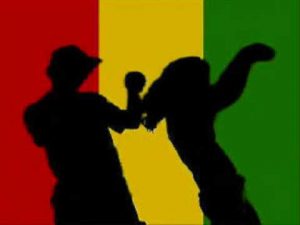- by Met
With the Jamaican carnival season now behind us, the ongoing debate concerning the popularity of carnival in Jamaica and the double standard as it relates to dancehall music, has once again come to the forefront
In addition to the creation of several Internet memes, showing the similarity between dancehall and carnival events, dancehall fans have been ranting on social media about the prominence of carnival and the unreasonable treatment of dancehall music in the country of its birth.
Producer ‘Skatta’ Burrell, hurled the first stone last Sunday during the Bacchanal Road March. The outspoken producer, openly criticised Jamaicans for showing more support for carnival events and soca than reggae events during reggae month.
He also highlighted that soca artistes were not as successful as King of Reggae Bob Marley, yet Kingston’s corporate area has never been on lockdown due to the celebration of the global icon.
Skatta Burrell’s comments were swiftly addressed by promoter IB Konteh, who said Jamaicans should stop pointing fingers at soca music. He instead suggested that Jamaicans direct their focus on finding solutions by creating networks with the government and private sector. While both Burrell and Konteh received favourable support from their respective followers, the memes continued to pop up on the Internet.
One meme worthy of mention, shows a female in a carnival party straddling a man with both legs around his waist. While another picture on the same meme, shows another female in a similar position, but in a dancehall setting.
The meme was created to show the unjust treatment of dancehall, for similar acts that are acceptable during carnival settings. The dancehall photo was labelled as having ‘no class’ while the soca party picture was labelled as ‘having fun’.
Strong message
The picture which went viral for its strong message, caught the eyes of graphic animator, Audel Enigma.
When contacted, he told The Sunday Gleaner, that dancehall as a genre was not the problem. He believes, however, that classicism is the only thing preventing dancehall from getting its due respect.
“The persons who support carnival are the rich people and they will do all it takes to produce carnival in a first class way. The same people will bash dancehall because it is the creation of the poor man. Judging by the skin tone you can tell who the target is and who is not. Even a simple thing as a road march, I have seen women turn around and see a light skinned guy dancing behind them and they don’t argue. But as soon as the dark skinned guy comes along, they move or push him away,” he said.
According to Enigma, Corporate Jamaica is comprised of the same people who are members of Jamaica’s upper class, which explains the lack of sponsorship and blackballing of dancehall music.
“Big up people like Magnum and Guinness and a few rum companies. But on a serious note, some of the things that occur at carnival, if it was dancehall, such events would lose sponsorship…not that dancehall has a lot of sponsors to lose which even strengthens my point, but carnival is allowed to get away with many things and that my friend is classism for you,” he said.
Radio disc jock and sound system operator DJ Rush, also took to social media to discuss the growing acceptance of soca music and carnival culture in the island. He says dancehall is widely accepted in Trinidad, therefore he has no issues with supporting the soca genre.
He however, pointed out that where there was a lapse in the production of quality Jamaican music, and foreign genres came into play.
“Up until 2005, if you go to a party and play soca music the people dem wah kill yu. So what happen in the mid 2000s why the sudden change? And if you think about it, is the same time the music change. I know a lot of persons who not only participated in the music as a patron but they helped to build it, and they started to tune out. I know a lot of selectors who played music in the 90s on the biggest sound systems and they don’t want to listen to dancehall anymore. The problem is that we as the music industry, we change our own thing and little by little, the people tune out…when music is not giving people what they want, they get their musical fix elsewhere,” he said.
The selector said there was no concentrated effort by persons in Jamaica to eliminate dancehall and support a foreign product. However, dancehall has not been living up to expectations.
“When people embracing soca music in Jamaica, it’s not because there is a conspiracy, it’s because the music weh dem used to like, is gone. The people dem weh a sey how so much soca music is being played in Jamaica, if you go to Trinidad it’s the same thing. Dancehall music is played on Trinidad radio more than soca music, outside of the carnival season…the music weh wi a duh, we can do better,” he argued.
Poor support
As it relates to Corporate Jamaica’s relatively poor support of dancehall music, DJ Rush told The Sunday Gleaner, that the production of better music can facilitate a shift. He also pointed out that it was not the responsibility of Corporate Jamaica to save the face of dancehall.
“It’s easy to point fingers at everyone else. But why is it that such a notoriously difficult business such as Trinidad soca, allowed Byron Lee in? How did he change the industry? His music was undeniable and the quality of it changed the paradigm,” he said.


Mi like dah read yah…. Mi ago change some things an give some real music oh….. big up met
Plain and simple, sex sells…